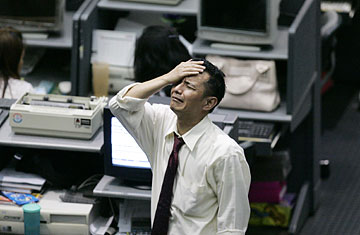
An Indonesian trader reacts on the floor of the Indonesia Stock Exchange in Jakarta on Oct. 8, the day the nation’s benchmark stock index plunged 10%
The carnage on Asian stock markets intensified on Wednesday as panicky investors looked for a coordinated response from the U.S. and Europe to stem the deepening financial crisis.
That response did come. The Federal Reserve said it would lower interest rates by 50 basis points along with five other central banks: the European Central Bank, the Bank of England and the Swiss, Canadian and Swedish banks. But the announcement arrived after Asian markets had closed, too late to put the brakes on a near free fall in Asian stocks that began on Monday. In Japan, the world's second-largest economy, the benchmark Nikkei index plummeted 9.4%, its biggest one-day drop since the global stock market crash of October 1987. Hong Kong's benchmark Hang Seng index fell 8.2%, while Seoul's Kospi dropped 5.8%. Indonesia shut down its stock market after shares plunged more than 10%. It is unclear when trading will resume. "We need to watch further before we can open," Erry Firmansyah, the exchange's president, told reporters.
Masaaki Kanno, chief economist at JPMorgan Securities in Japan, summed up the frantic day in Asia. "Investor sentiment is in panic," Kanno said over the prospect of the spreading financial crisis dragging the global economy into a severe recession. The latest economic indicators are fueling this loss of confidence. For example, Japan's corporate bankruptcies jumped 34% in September, the largest increase since 2000, according to Tokyo Shoko Research.
Stocks continued to slide despite a spate of actions yesterday by Asian governments to stem financial volatility, boost economies and prop up markets. The People's Bank of China cut interest rates for the second time in three weeks, while reducing the reserve requirement ratio for most banks. The Hong Kong Monetary Authority, Hong Kong's de facto central bank, also reduced the interest rate at which it lends to banks by a full percentage point in an attempt to ease credit markets. In India, policymakers promised to continue to act to keep the financial sector functioning. "If need be, we will take further measures to infuse liquidity in the market," India's Finance Minister, Palaniappan Chidambaram, told reporters.
The Fed's decision to cut interest rates could cheer Asian investors concerned that a deep economic slump in the West will derail Asia's export-driven economies. The quandary facing Asia's policymakers is that credit is tightening and stocks are plunging due to circumstances mostly beyond their control. "Central banks in Asia don't have the ability to fix the problem," said Kirby Daley, senior strategist at financial services firm Newedge Group in Hong Kong.
The question now is whether or not the Fed's rate cut is enough to reverse the markets' downward spiral. Many analysts in Asia say it is not. "I don't think that the coordinated rate cut will work," said JPMorgan's Kanno. "The only thing it could do is to buy time. Monetary policy doesn't work anymore, once confidence is lost." Kanno and other observers in Japan — recalling their own painful financial crisis in the 1990s — believe the solution needs to be far more dramatic. They advocate that the U.S. government directly invest taxpayer money into private financial firms. "The authorities must do anything they can," Kanno says. "If the banks are in trouble, they can be nationalized and the government can protect the whole system." Yesterday, Britain pledged hundreds of billions of dollars in credits, guarantees and cash to shore up its banking system. The package included partial nationalization of some of the country's major banks.
All eyes are now on the upcoming meeting of G-7 finance ministers and central bank chiefs scheduled for Friday in Washington. On Tuesday, Japan's Prime Minister, Taro Aso, urged industrialized countries to take further measures to shore up credit markets. "The impact would be substantial if the G-7 didn't send a clear message," he said. Meanwhile, as the crisis continues to deepen, Asia's frustration continues to mount. "Masters of the Universe have bitten the dust, the same dust that is now in the mouths of the rest of us," Nirupam Sen, India's permanent representative to the U.N., said on Monday. The dust doesn't look likely to settle anytime soon.
— With reporting by Coco Masters / Tokyo, Madhur Singh / New Delhi and Jason Tedjasukmana / Jakarta
